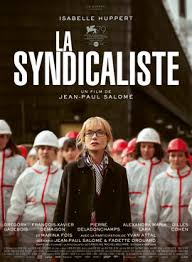
THE SITTING DUCK/ LA SYNDACALISTE
France, 2023, 121 minutes, Colour.
Isabelle Huppert, Gregory Gadbois, François-Xavier Demaison, Pierre Deladojnchamps, Alexandra Maria Lara, Mara Taquin, Yvan Attal, Marina Fois..
Directed by Jean-Paul Salome.
The English title, indicating an obvious target, does not quite do justice to the French title which indicates someone who is a member of a trade union. And this is the case with the central character, based on an actual people and events in France, starting in 2011, Maureen Kearny.
French actress, Isabelle Huppert, has been top lining films for more than 50 years, an impressive career and skill in bringing to life an enormous range of roles. Here, she does not look like herself, a face pale instead of freckles, blonde hair with a fringe, wearing spectacles. It is a commanding performance especially as we see her initially in Hungary, taking the sides of the female workers whose jobs are threatened, then returning to Paris, working with authorities, she and her female boss looked down on, snide but semi-loud comments from the male executives. It is clear that this is going to be a significant confrontation between men and women in the corporate world, and the corporate world and its confrontation with unions.
At the centre of this corporate world is a nuclear company, Avara, in competition with a French company but the French company in secret conversations with China, China wanting to expand its building nuclear reactors around the world. Maureen’s boss loses her job, a less competent executive is appointed in her place, quite some clashes with Maureen.
A whistleblower approaches Maureen with damning documents and, what follows, is tangles with bureaucracy, the change of the French president, looking down on Maureen because she is a woman, because she is a Unionist. Then, she is viciously assaulted in her home.
The screenplay then veers away from the complexities of the nuclear companies, indicating what happened in fact, Chinese expansion of French jobs. Maureen is continually supported by the unions and their leaders.
The film then focuses on Maureen, the attack, the police investigation, the audience finding, once again that the word of the woman is not immediately accepted, is doubted, she herself coming under suspicion, especially when there has been trauma in the past, drinking, a suicide attempt.
While Maureen might have been the sitting duck for this assault, and she does cave in to the police for a time, the latter part of the film is her standing up for herself, even taking years, examining the situation, the work of skilful lawyers, a court appearance and her vindication.
Maureen Kearny is a strong character, to be admired in the early part of the film and, compassion for her and her struggles after the assault and the police investigations. She is supported by her husband of 20 years, Gregory Gadebois quite the opposite of his leading role in A Great Friend, and a complex relationship with her daughter.
Interesting themes in themselves, very relevant in these times of #MeToo, and yet another fine performance from Isabelle Huppert.
- Based on a true story? 2011-2017?
- A French story, French corporations, nuclear corporations, the unions, union representatives, deals, international deals, secrecy, whistleblowers? And the targeting of the union representative, a sort, police investigations, court cases?
- The opening, Maureen in Hungary, with the workers, standing up to the authorities, a return to Paris, is seven as her boss, her being relieved of her job, the meetings with the male executives, their mutterings and insults? The expose of male domination in the workplace?
- Maureen as union representative, the support of the unions, the meetings? The background, 20 years with her husband, his support, sometimes exasperation? Her daughter, sometimes rebellious, sometimes supportive? The background of her drinking, attempted suicide, mental states?
- The whistleblower, the documentation, the situation with the company, financial difficulties, change of CEO, the new official, the opinion of him as weak, the meetings with Maureen, flaring up? The Chinese, the deals behind the scenes, documentation? Politicians?
- Maureen and her interventions, suspicions, union support, the change of government, the new President, going to see the minister the discussions with Anne, tensions??
- The impact of the assault, seeing it at the beginning of the film, the aftermath, the effect on Maureen? The screenplay coming back to the assault, the effect on Maureen, her fears, husband’s response, daughter?
- The police investigation, the chief investigator, interrogations, the screenplay highlighting how a woman is treated in this this kind of assault case, a man? The questions, the replay of the situation, suspicions, her work being doubted, seeming inconsistencies? The pressure on her, her confessing that she had made it up? The police response, the media, her name being black and?
- Her change of heart, the reaction of the police, the years taken in going back over the case, the re-creation, the possibilities and import possibilities, the reality of Maureen and her injured shoulder (and the sequences of the doctor’s consultations and tests), employing the more skilled lawyer, the case, her case being proven, the condemnation of the police investigator, of the treatment of women?
- The impact of the film as a portrait of Maureen, her work, the attack, the consequences, her reputation, her vindication?
- The impact of the film and corporations, deals, political implications, the unions?
- The impact of the film in the context of the 2010s, the #MeToo movement and greater awareness of male bullying, exploitation and treatment of women?